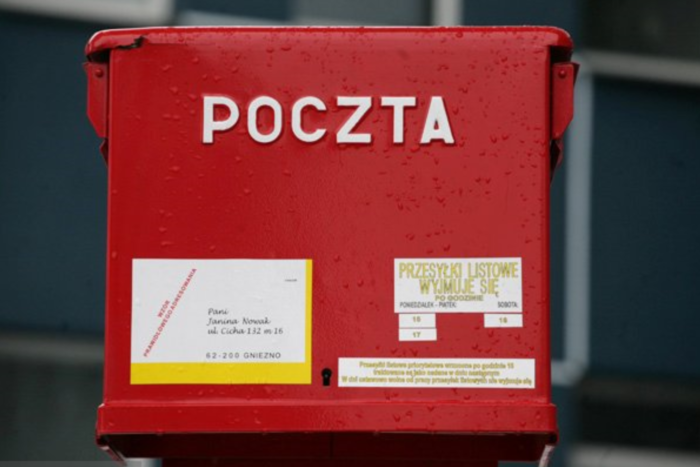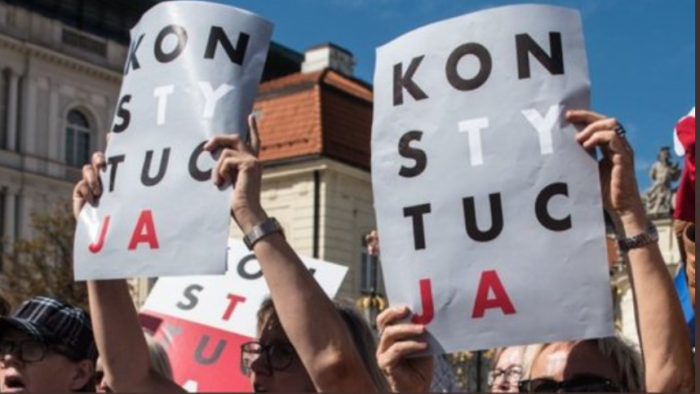Why the haste? Polish presidential elections, PiS and constitutional conundrum

The times require unusual measures; however, the way the Polish government seeks to handle the upcoming presidential elections planned for the 10th of May is raising eyebrows. Even to those entirely unfamiliar with technicalities of elections, the current haste, amidst the pandemic, casts doubts on reliability of the results. Sadly, beyond the surface it appears that the government’s arrangements are a prescription for more troubles. This post is a brief summary of the most evident legal tensions with regards the current constitution and the proposed voting by post. It comes as a result of livid discussions with constitutionalists and legal experts who shared their opinion on the matter. Their personal preference was to remain anonymous.
Constitution: translating legal jargon?
It is close to obvious, that for those who are not in the legal circles it remains difficult to comprehend the particular language which the lawyers employ. Indeed, there are laws which are tremendously complicated, and to an unfamiliar mind constitute a maze of improbable collocations. The Constitution of the Republic of Poland is far from those. This fundamental law, that by virtue of definition, takes precedence before any other legislature, is easily comprehendible. Purposely so, as in democratic countries, the citizens are expected to be aware of their fundamental rights and responsibilities. As Poland remains a parliamentary republic, the sovereign i.e. the nation, exercises its powers through its representatives (Preamble and Art.4 of the constitution). Constitution is particularly detailed with regards how the sovereign’s representatives are to be elected. There is no doubt, that the newest amendment of the election laws is unconstitutional. As a consulted constitutional expert for this post has put it: “One does not even need to have a law degree to be able to see the evidence of it”. This post takes a succinct review on how and why the government is rounding legal corners to proceed with the presidential elections with such a determination.
Preamble: setting the context right
At the time of writing, there is no legal instrument allowing presidential elections by post. The law (that is the legal act from 16th April Dz.U. 2020 r.poz.695) which PiS has passed in the lower house (Sejm) of Parliament is currently under review in the upper house (Senate). The leader of PiS, Jarosław Kaczynski, has lost the majority in the Senate following the 2019 parliamentary elections and given that the Senate is in the oppositions’ hands, this legislature is expected to await the legal maximum of 30 days. The lack of legal basis is important to keep in mind when the following aspects of the amended law are considered below. Notwithstanding the lack of legal basis for action, the government has however proceeded with prescriptions of the law which is not yet essentially binding. The voting cards are being printed, and post offices are in the midst of preparations. Having that in mind, let us take a deep dive into parallel reality of PiS’s electoral proceedings.
Reason I: Elections must be direct
Voting by post, by definition, is not direct. Direct voting entails that any citizen is directly casting the ballot, on a candidate with no intermediaries. The vote itself remains assigned to a given candidate, however, the voting card is not directly cast to the sole constitutionally allowed organ to receive it, that is the National Electoral Commission (PKW). In a way, the government has de facto reassigned the competence of the PKW to the State Postal Administration (Poczta Polska, SPA). Repercussions are of the following nature. Firstly, SPA has no legal basis to proceed, hypothetically it may be liable for such endeavour, though a litigation in the current climate remains rather a remote, yet not entirely unimaginable possibility.
Secondly, the SPA has no institutional memory of such enterprise. The frequent comparisons to Bavarian case for the recent elections are entirely out of place. The scale of Bavarian elections was nowhere near the Polish ones. The Bavarian electoral commission was expecting a maximum of 10 million voters, whereas in Poland we are considering 30 million. That makes an improbable comparison both in technical as well as financial burden on SPA to handle. Secondly, Bavaria had only a regional scale of elections – one may merely anticipate the logistics of providing an equal and universal ballot by post to the whole country. Lastly, as Mateusz Mazzini has noted, Bavaria had only included a fifth of its total electoral units to vote by post. The local authorities justified that by the difficulties with timely provision of cards and the staff’s ability to count the votes. As consulted with other experts from the field, in procedural terms, it is comparing an apple with its seed.
Reason II: Elected by the Nation
Seeing the most recent developments, particularly shared concerns of the city mayors of being reached by the anonymous, possibly generic email from the SPA to share the details of all residents within a given voivodship, it substantiates the claim, that the government is not staying put for the amendments of the election laws to be passed by the Parliament. The newly appointed Deputy Prime Minister, Jacek Sasin, has already confirmed the voting cards are being printed to proceed with voting by post. Such developments might even be an interesting chapter for a 1984 George Orwell continuation, however, tragically these are far from fiction. First, voting by post will exclude the nationals who do not reside in the country. That is a critical consequence making these elections far from what constitution stipulated. Moreover, there is another shade of worry. The issue with oversight over who indeed marks the voting card remains unresolved. Handing in a voting card to the eligible voter provides no guarantees on the later proceedings. Historically, such incidents happened, where voters unwilling to cast their vote simply sold the voting card to those willing to pay or gave them away making the whole enterprise missing the prescribed objective of just and equal elections.
Reason III: In a secret ballot
What is the governments assurance for the voting to remain secret? As previously, there is no assurance, given the scale and scope, that the votes will remain secret during the logistics. Comparably to a traditional vote, the voting cards are logically ‘more exposed’ to potential damage, loss, or deliberate externality caused by an individual. This concern is equally connected to legal protection of data privacy on the national as well as the EU level. Firstly, by the letter of law postal service has no legal capacity to acquire or process such type of data. Secondly, the residents may not be willing, and justifiably so, to share so drastically sensitive and confidential data that go way beyond merely a name and address. According to the recent social post by the current president of Gdansk, Aleksandra Dulkiewicz, the post office requested a PESEL number (that is an Universal Electronic System for Registration of the Population), a unique identification number that includes the birth date. Along the other critical information, as address, given names and surname, it is a complete set of identity markers. If such data is not handled carefully, potential leak may have tremendous implications, as for instance identity theft.
Reason IV: Every vote is equal
Lastly, is the voting by post assuring an election are equal? That is, every individual’s vote counts as one. Arguably, there is little oversight to see if that is the case. The question of handling of ‘unused votes’ remains open, as these may end up in inappropriate hands. That invites an assumption that effectively one voter may not equal one vote. Secondly, and already briefly discussed in another blog post, there is the question of liability. According to the current electoral law, destruction of a voting card is an offence punishable 3 years prison. Practicality of its enforcement remains a faint possibility, yet those individuals who perhaps would not cast a vote, in the current elevated level of uncertainty would feel pressured to proceed with voting. Needless to mention there is effectively no time to communicate the content of the amended laws to the public, as the amendments might not have been passed before the elections take place.

“We the Polish Nation”: Representing the sovereign, not anymore?
The post summarized the most evident reasons why voting by post seems a dubious idea for the current circumstance. The haste, lack of institutional capacity and bypassing all the possible legal measures makes a recipe for electoral fraud, or at least a questionable result. Moreover, according to the recent polls, 57% of the electorate finds the voting by post as a bad idea. Why the government is not taking a step back? Arguably, politics. The longer the crisis takes a toll on economy, the lesser the government’s potential to assure the electorate of its capacity to handle it.
Having already lost the Senate, PiS is not willing to risk losing its penholder, the current president and electoral frontrunner Andrzej Duda. Secondly, the government was already making all potentially imaginable not to impose the state of emergency. Had it done so the following two consequential things would need to occur. First, by the letter of the law, during the state of emergency elections must not take place (Art 22.7 of the Constitution). The second inevitability is that during the emergency state the Sejm must not amend any election laws, including those concerning Presidential elections. Yet, ironically, majority of the provisions which would normally abide during the imposed state of emergency, are de facto already in place. Legally speaking, PiS has bypassed the very mechanism defined by the constitution to be used in the current circumstance. The government justified it by assuring the public that the state is in a ‘workable daily normality’. Had that indeed been the case, the government would not even propose postal voting, as in the normal circumstance, it would proceed as initially planned.
Lastly, as already underlined, Polish society has always had traditional elections. There is no societal nor institutional memory of proceedings of such manner and scale. Moreover, no justification is satisfactory for the authorities to attempt such administrative endeavour during the extremely challenging socio-economic crisis caused by the Covid-19 pandemic. The government’s rush to proceed as usual, substantiates the claim that politics has took precedence before the law, and ergo before the sovereign. It would therefore seem that the current government ceased representing interest of the nation, it merely seeks political reassurance of its rule.